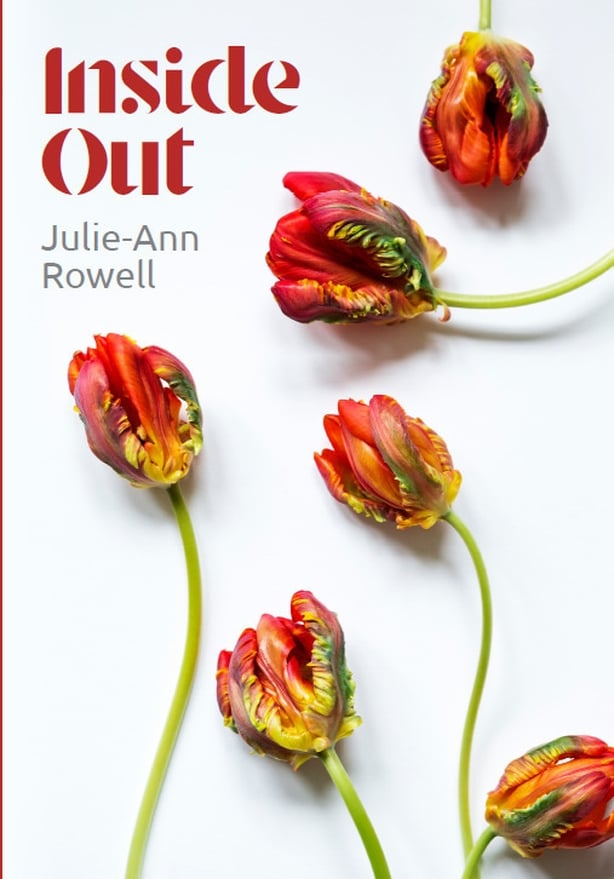We present a series of poems from Inside Out, the new collection from Julie-Ann Rowell.
The poems in this remarkable collection offer a fearless account of an individual grappling with the physical, emotional and social challenges of living with chronic illness.
FND – Functional Neurological Disorder – is a disorder in the functioning of the nervous system, whose symptoms include a variety of physical, sensory and cognitive symptoms such as seizures, dizziness, chronic pain, speech impairment, paralysis.
The poet documents her journey from diagnosis, through hospitalisation, discharge and eventual recovery. Inside Out is a moving and uplifting testament to the resilience of the human body and spirit.
Our half-moon garden is surrounded by a tall fence,
an overhang at the top, a padlocked gate.
Is it designed to keep us in as well as keep others out?
I'd like to debate this, but it never comes up.
I watch staff hurrying along the path outside.
Once saw my CBT Therapist crammed
into her cycling gear. The path must be an important
route between somewhere and somewhere; I’ll never
find out. I gaze through the diamonds of wire at a blackbird
on the trimmed lawn, foraging in sight of the sick.
A cat often slides under the gate,
white and grey-flecked it steals its way
to the automatic door leading to the dining space
I’ve come to hate.
Sometimes, I have the garden to myself: a shed
full of chairs in disrepair and attempts at borders
with sprawling bushes, the occasional strawberry
plant coming into season. Potted plants with
fizzy drink cans stuffed in them, shreds
of roll-ups on the hexagonal paving.
It’s where I’m supposed to relax –
'Try the garden,’ the OT said, ‘to clear your head.’
Benches face in on each other; in the centre
a circle of greenery edged with painted stones
decorated by former patients, some bright, all suns and stars,
others indecipherable which makes perfect sense.
*
My head shakes from side to side.
Neurologist calls it a No-No pattern.
I wonder what I’m saying No to.
It could be anything considering what’s
going on right now. I’m communicating
a big fat NO because I can’t help myself,
it’s exhausting. My neck strains
with pain. I’m dizzy, it’s hard to read a book.
I want to stop saying No and say Yes
to something. It would have to be
meaningful, not merely a cup of coffee
or that dress online with the cinched waist.
I ask Neurologist, ‘Will the No-No
ever stop?’ He can’t be sure,
it’s well locked in. My brain’s rewired
like a circuitry set I played with as a child
only this circuitry can’t be altered easily.
Is it No-No to life with its complex
terms and conditions? I hope not.
That’s partly why I’m in this unit hidden
from the world. But the world is never
far away. One of the patients mocks
my tic this morning at breakfast.
‘It goes like this.’ She gives a fairly
decent impression. I’ve never liked her
except she’s confined to a wheelchair –
her legs saying No-No for fifteen years.
*
Receptionist brings post to our rooms,
leaves it on the bed if we’re not there.
‘You receive the most of anyone’, she says.
Letters do the talking. I find it hard to speak.
I’ve swallowed my voice. It’s working
its way back up, climbing my throat
with crampons and rope.
Receptionist might not realise but
she brings love into the room. A friend
writes every day, a note, a card, a letter
telling me how much I’m cared about.
She holds me in her words,
tending to me, knowing I can’t answer,
not even a text, my fingers scurrying
to make sense, my tiny phone’s screen a blur.
The window bay is full of cards.
They stand firm in their neat rows because
the window doesn’t open. No breeze
to scatter them, blow their sense to
the sticky linoleum floor, nor
sooth the saturating heat. But they speak.
*
I venture into town on my own,
a short way in among the shoppers
when Woman stops and turns,
her eyes dark pith, ‘You’re drunk!’
She’s dressed in baggy floral trousers,
padded jacket (fabric probably from Nepal).
I can’t find a retort, wobbling around
hands shaking. Not respectable.
My throat goes into a laryngospasm:
sentences form but cannot be spoken.
She looks me over as if I’m on sale,
the goods seriously defective.
I fumble for the FND leaflet in my pocket,
but she storms off, her indignation
intact. I tremble my way home head lowered
in case of a stampede of disapproval –
a well-dressed woman tanked in daytime,
probably pissing her knickers.
A BBC Play for Today flicks through my mind –
‘Edna, the Inebriate Woman’, an alcoholic
on a psychiatric ward, looking old-young,
her belongings in a worn-out plastic bag.
How sorry I’d been at nine years old
for her sorriness. Now my fifty-eight-year-old self
struggles, my eyes pooling so the pavement
shivers away from me. It doesn’t matter,
imagine Edna, keep walking, making demands –
‘It’s my right, I’ve got every right.’
Inside Out is published by Turas Press

About The Poet: Julie-Ann Rowell is a multi-award-winning poet whose work has won, and been shortlisted for, many prestigious awards. Her poems have been included in over twenty anthologies and many more are published in magazines and journals. She has an MA in Creative Writing from Bath Spa University.

